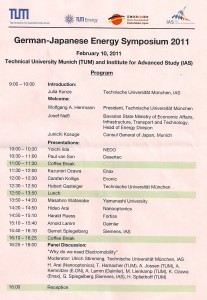Technical University of Munich (TUM-IAS)
10.02.2011
Summary/ Abstract
Research & Development and Business Opportunities for Optimal Sustainable Energy Allocation
KEY-QUESTION:
– Why do we need electro-mobility?
QUESTIONS ABOUT THE UNKNOWN:
– Development of battery technology, infrastructure?
– Consumer Behaviour?
– Sales argument (emotion of the car, how will consumer expectations change over time)?
– Costs (TCO -Total Cost of Ownership) development?
STATUS (Feb 2011)
I) Vision Japan:
– Prevent global warming; increase energy efficiency (emission, efficiency, costs)
– Enhance competitiveness
– Create new technologies (battery, eCar architecture, …)
II) How to start in Japan:
– Develop infrastructure guideline
– Best practise handbook
– Pursue business model
III) eCars vs. combust engines:
– eCars have limited range
– No C02 savings today
– No profitable business models for car manufacturers yet
IV) Total-Cost-of-Ownership:
– Today eCar’s are more expensive than combust engine powered cars
V) Cheapest way to commute:
– via bus
– How many of the total traffic is already electric based today (public, transport, eCars, …)?
FUTURE/ OUTLOOK
– Japan (governmental program): in 2030: 20-30% eCars
– German (governmental Program): in 2050: 80% of energy consumption based on renewables
– Zero emission, zero failure (autonomous driving)
– Gap to overcome: poor/ rich – young/ older (change in demography)
TIPPING POINTS:
– Limited Oil
– Cost competitive cars based on renewable
– Existence of competitive fuell cells
– Consumer behaviour (zero emission car, perception of individual mobility, skort-, long distance comuting)
– Innovative car sharing services, e.g. pay as you use
QUESTIONS ABOUT THE CHALLENGES:
– What infrastructre do we need to preserve today’s habits of transport?
– How will our habits change, a) with increasing energy prices and b) with more people on low income?


